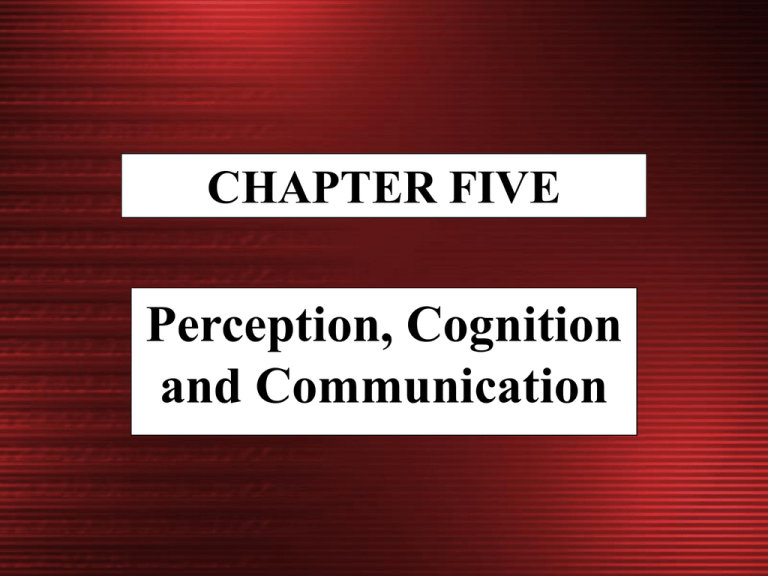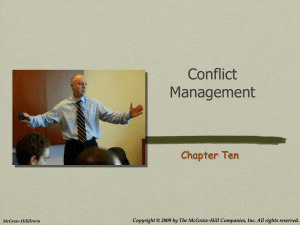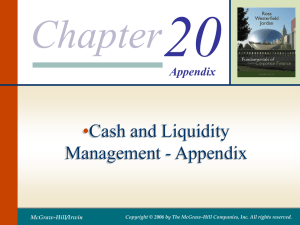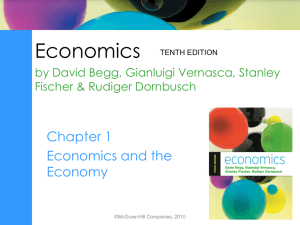
CHAPTER FIVE
Perception, Cognition
and Communication
5-2
Perception and Negotiation
The
role of perception
Perception distortion in negotiation
Framing
McGraw-Hill/Irwin
© 2004 The McGraw-Hill Companies, Inc., All Rights Reserved.
5-3
The Role of Perception
Perception: The process by which individuals
connect to their environment
– People interpret their environment in order to respond
appropriately
– The complexity of environments makes it impossible
to process all of the information
– As a result people develop shortcuts to process
information
– These shortcuts create perceptual errors
McGraw-Hill/Irwin
© 2004 The McGraw-Hill Companies, Inc., All Rights Reserved.
5-4
Perception Distortion in
Negotiation
Four
major perceptual errors:
– Stereotyping
– Halo effects
– Selective perception
– Projection
McGraw-Hill/Irwin
© 2004 The McGraw-Hill Companies, Inc., All Rights Reserved.
5-5
Stereotyping & Halo Effects
Stereotyping: An individual assigns
attributes to another solely on the basis of the
other’s membership in a particular social or
demographic group
– “Old people are conservative; this person is
old and therefore is conservative”
Halo Effects: An individual generalizes
about a variety of attributes based on the
knowledge of one attribute of an individual
– “He is smiling therefore he is also honest”
McGraw-Hill/Irwin
© 2004 The McGraw-Hill Companies, Inc., All Rights Reserved.
5-6
Selective Perception &
Projection
Selective Perception: The perceiver singles out
information that supports a prior belief but
filters out contrary information
– The person who thinks “He is smiling therefore he is
also honest” ignores behavior indicating the other
party’s aggressiveness
Projection: People ascribe to others the
characteristics that they possess themselves
– “I am honest therefore she is honest also”
McGraw-Hill/Irwin
© 2004 The McGraw-Hill Companies, Inc., All Rights Reserved.
5-7
Framing
Frames:
– The subjective mechanism through which
people evaluate and make sense out of
situations
– Lead people to pursue or avoid subsequent
actions
About
focusing, shaping and organizing the world
around us
Making sense of complex realities
Defining realities in ways that are meaningful to
us
McGraw-Hill/Irwin
© 2004 The McGraw-Hill Companies, Inc., All Rights Reserved.
5-8
Cognitive Biases in Negotiation
Negotiators have a
tendency to make
systematic errors when
they process information.
These cognitive biases,
impede negotiator
performance; they
include:
– Irrational Escalation of
Commitment
– Mythical Fixed-Pie
Beliefs
McGraw-Hill/Irwin
– Anchoring and
Adjustment
– Framing
– Availability of
Information
– Winners Curse
– Overconfidence
– The Law of Small
Numbers
– Self-Serving Biases
– Endowment Effect
– Ignoring Other’s
Cognitions
– Reactive Devaluation
© 2004 The McGraw-Hill Companies, Inc., All Rights Reserved.
5-9
Irrational Escalation of Commitment
& Mythical Fixed-Pie Beliefs
Irrational Escalation of Commitment
– Negotiators maintain commitment to a course
of action even when that commitment
constitutes irrational behavior
Mythical Fixed-Pie Beliefs
– Negotiators assume that all negotiations (not
just some) involve a fixed pie
McGraw-Hill/Irwin
© 2004 The McGraw-Hill Companies, Inc., All Rights Reserved.
5-10
Anchoring and Adjustment
& Framing
Anchoring and Adjustment
– The effect of the standard (anchor) against which
subsequent adjustments (gains or losses) are
measured
– The anchor might be based on faulty or
incomplete information, thus be misleading
Framing
– Frames can lead people to seek, avoid, or be
neutral about risk in decision making and
negotiation
McGraw-Hill/Irwin
© 2004 The McGraw-Hill Companies, Inc., All Rights Reserved.
5-11
Availability of Information
& The Winners Curse
Availability of Information
– Operates when information that is presented in
vivid or attention-getting ways becomes easy to
recall.
– Becomes central and critical in evaluating events
and options
The Winners Curse
– The tendency to settle quickly on an item and
then subsequently feel discomfort about a win
that comes too easily
McGraw-Hill/Irwin
© 2004 The McGraw-Hill Companies, Inc., All Rights Reserved.
5-12
Overconfidence &
The Law of Small Numbers
Overconfidence
– The tendency of negotiators to believe that their
ability to be correct or accurate is greater than is
actually true
The Law of Small Numbers
– The tendency of people to draw conclusions
from small sample sizes
– The smaller sample, the greater the possibility
that past lessons will be erroneously used to infer
what will happen in the future
McGraw-Hill/Irwin
© 2004 The McGraw-Hill Companies, Inc., All Rights Reserved.
5-13
Self-Serving Biases
& Endowment Effect
Self-Serving Biases
– People often explain another person’s behavior by
making attributions, either to the person or to the
situation
– The tendency is to:
Overestimate the role of personal or internal factors
Underestimate the role of situational or external factors
Endowment Effect
– The tendency to overvalue something you own or
believe you possess
McGraw-Hill/Irwin
© 2004 The McGraw-Hill Companies, Inc., All Rights Reserved.
5-14
Ignoring Other’s Cognitions
& Reactive Devaluation
Ignoring Other’s Cognitions
– Negotiators don’t bother to ask about the other
party’s perceptions and thoughts
– This leaves them to work with incomplete
information, and thus produces faulty results
Reactive Devaluation
– The process of devaluing the other party’s
concessions simply because the other party made
them
McGraw-Hill/Irwin
© 2004 The McGraw-Hill Companies, Inc., All Rights Reserved.
5-15
Managing Misperceptions and
Cognitive Biases in Negotiation
The best advice is:
Be aware of the negative aspects of these
effects
Discuss them in a structured manner
within their team and with their
counterparts
McGraw-Hill/Irwin
© 2004 The McGraw-Hill Companies, Inc., All Rights Reserved.
5-16
What is Communicated During
Negotiation?
Offers and counteroffers
Information about alternatives
Information about outcomes
Social accounts
– Explanations of mitigating circumstances
– Explanations of exonerating circumstances
– Reframing explanations
Communication about the negotiation
process
McGraw-Hill/Irwin
© 2004 The McGraw-Hill Companies, Inc., All Rights Reserved.
5-17
How People Communicate in
Negotiation
Use of Language
– Logical level (proposals, offers)
– Pragmatic level (semantics, syntax, style)
Selection of a Communication Channel
– Social presence is key variation that distinguishes
one channel from another
– Social presence is the ability of a channel to carry
and convey subtle social cues from sender to
receiver
– It goes beyond the literal “text” of the message
itself
McGraw-Hill/Irwin
© 2004 The McGraw-Hill Companies, Inc., All Rights Reserved.
5-18
How to Improve Communication
in Negotiation
The Use of Questions
– Manageable
Cause
attention or prepare the other person’s
thinking for:
– Further questions
– Getting information
– Generating thoughts
– Unmanageable
Cause
difficulty, give information and bring the
discussion to a false conclusion
McGraw-Hill/Irwin
© 2004 The McGraw-Hill Companies, Inc., All Rights Reserved.
5-19
How to Improve Communication
in Negotiation (cont.)
Listening: Three major forms
– Passive listening
No
feedback to the sender
– Acknowledgment:
Receivers
nod their heads, maintain eye contact,
or interject responses
– Active listening:
Receivers
restate or paraphrase the sender’s
message in their own language
McGraw-Hill/Irwin
© 2004 The McGraw-Hill Companies, Inc., All Rights Reserved.
5-20
How to Improve Communication
in Negotiation (cont.)
Using active listening encourages people
to speak more fully about their:
–
–
–
–
Feelings
Priorities
Frames of reference
Positions
McGraw-Hill/Irwin
© 2004 The McGraw-Hill Companies, Inc., All Rights Reserved.
5-21
How to Improve Communication
in Negotiation (cont.)
Role Reversal
– Allows negotiators to understand the other
party’s positions by actively arguing these
positions
McGraw-Hill/Irwin
© 2004 The McGraw-Hill Companies, Inc., All Rights Reserved.
5-22
Mood, Emotion and Negotiation
Negotiations Create Both Positive and Negative
Emotions
Positive Emotions Generally Have Positive
Consequences for Negotiations
– They are more likely to lead the parties toward
more integrative processes
– They promote persistence
McGraw-Hill/Irwin
© 2004 The McGraw-Hill Companies, Inc., All Rights Reserved.
5-23
Mood, Emotion and Negotiation
Positive Emotions Generally Have
Positive Consequences for Negotiations
(cont.)
– They result from fair procedures during
negotiation
Negotiators
in a positive mood may be less likely
to examine closely the arguments put forward by
the other party
McGraw-Hill/Irwin
© 2004 The McGraw-Hill Companies, Inc., All Rights Reserved.
5-24
Mood, Emotion and Negotiation
Negative Emotions Generally Have
Negative Consequences for Negotiations
– They may lead parties to define the situation
as competitive or distributive
– They may lead parties to escalate the conflict
– They may lead parties to use retaliatory
behavior and obtain poorer outcomes
McGraw-Hill/Irwin
© 2004 The McGraw-Hill Companies, Inc., All Rights Reserved.
5-25
Mood, Emotion and Negotiation
Negative Emotions Generally Have Negative
Consequences for Negotiations (cont.)
– They may result from impasse
Anger
can serve as a danger signal that motivates
both parties to confront the problem directly and
search for a resolution
Emotions Can Be Used Strategically As
Negotiation Tactics
McGraw-Hill/Irwin
© 2004 The McGraw-Hill Companies, Inc., All Rights Reserved.









